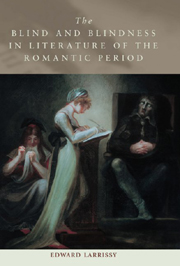Book contents
- Frontmatter
- Contents
- Preface
- Acknowledgements
- 1 The Enigma of the Blind
- 2 The Celtic Bard in Ireland and Britain: Blindness and Second Sight
- 3 Blake: Removing the Curse by Printing for the Blind
- 4 Edifying Tales
- 5 Wordsworth's Transitions
- 6 Coleridge, Keats and a Full Perception
- 7 Byron and Shelley: The Blindness of Reason
- 8 Mary Shelley: Blind Fathers and the Magnetic Globe: Frankenstein with Valperga and The Last Man
- 9 Conclusion
- Bibliography
- Index
9 - Conclusion
Published online by Cambridge University Press: 12 September 2012
- Frontmatter
- Contents
- Preface
- Acknowledgements
- 1 The Enigma of the Blind
- 2 The Celtic Bard in Ireland and Britain: Blindness and Second Sight
- 3 Blake: Removing the Curse by Printing for the Blind
- 4 Edifying Tales
- 5 Wordsworth's Transitions
- 6 Coleridge, Keats and a Full Perception
- 7 Byron and Shelley: The Blindness of Reason
- 8 Mary Shelley: Blind Fathers and the Magnetic Globe: Frankenstein with Valperga and The Last Man
- 9 Conclusion
- Bibliography
- Index
Summary
The idea of blindness – as trope, as image, or exemplified in a character – is central to to some of the most important texts of British Romanticism. The blind, and developed figures of blindness, offer ways of exploring an individual consciousness which conceives itself as, so to speak, lost in history. This consciousness is nostalgic for an innocence and immediacy of vision which it knows cannot be recovered in modern society, and which, moreover, have been thoroughly analysed by modern philosophy and political economy, with the result that even the fleeting glimpses of vision now vouchsafed have to be understood in terms of these discourses. This is even the case, in my estimation, with one who seems as anti-Lockeian as Blake. Yet even as the blind can be shown to be capable, so the modern world will find that it can live, to borrow a phrase of Wordsworth's, ‘in reconcilement with its stinted powers’. Not only does Romantic writing figure the capability of disability, but it makes such conditional capability the very emblem of knowledge in the modern world, and even of knowledge in general. We inherit from the Romantic period the hesitation between direct experience and laborious historical understanding which is at the root of the symbolic uses to which blindness was then put; and we also inherit an epistemological version of the capability of disability to which we give names such as Blindness and Insight, or the ‘prosthesis’ of the blind man's stick in Derrida's Memoirs of the Blind, which is a version of his ‘supplement’, and thus not really ‘compensatory’ at all, but rather an apt image of expression and interpretation in general. When we look back to investigate the root of this important nexus of ideas, we find it explored not only in subtle and scarcely apprehensible tropes, but as a direct result of a meditation on the condition of the blind which preoccupied the thinkers of the eighteenth century.
- Type
- Chapter
- Information
- Publisher: Edinburgh University PressPrint publication year: 2007



